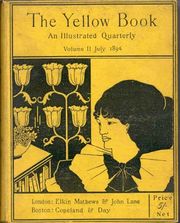
A Defence of Cosmetics
Encyclopedia

Essay
An essay is a piece of writing which is often written from an author's personal point of view. Essays can consist of a number of elements, including: literary criticism, political manifestos, learned arguments, observations of daily life, recollections, and reflections of the author. The definition...
by caricaturist
Caricature
A caricature is a portrait that exaggerates or distorts the essence of a person or thing to create an easily identifiable visual likeness. In literature, a caricature is a description of a person using exaggeration of some characteristics and oversimplification of others.Caricatures can be...
and parodist
Parody
A parody , in current usage, is an imitative work created to mock, comment on, or trivialise an original work, its subject, author, style, or some other target, by means of humorous, satiric or ironic imitation...
Max Beerbohm
Max Beerbohm
Sir Henry Maximilian "Max" Beerbohm was an English essayist, parodist and caricaturist best known today for his 1911 novel Zuleika Dobson.-Early life:...
and published in the first edition of The Yellow Book in April 1894. Aged 21 when the essay was published, it established his reputation. It later appeared in his first book, The Works of Max Beerbohm
The Works of Max Beerbohm
The Works of Max Beerbohm was the first book published by English caricaturist, essayist and parodist Max Beerbohm. It was published in 1896 when Beerbohm was aged 24....
(1896) as The Pervasion of Rouge.
Written while still an undergraduate at Merton College, Oxford
Merton College, Oxford
Merton College is one of the constituent colleges of the University of Oxford in England. Its foundation can be traced back to the 1260s when Walter de Merton, chancellor to Henry III and later to Edward I, first drew up statutes for an independent academic community and established endowments to...
, Beerbohm intended that his essay A Peep into the Past
A Peep into the Past
A Peep into the Past is a 1923 unauthorized and privately printed essay on Oscar Wilde by caricaturist and parodist Max Beerbohm.Beerbohm wrote this satire on Oscar Wilde in late 1893 or early 1894 for publication in the first number of The Yellow Book, but it was held over to make way for...
, a satire on Oscar Wilde
Oscar Wilde
Oscar Fingal O'Flahertie Wills Wilde was an Irish writer and poet. After writing in different forms throughout the 1880s, he became one of London's most popular playwrights in the early 1890s...
, should be published in the first number of The Yellow Book, but it was held over to make way for another essay, A Defence of Cosmetics, which appeared in that journal in April 1894. A Peep into the Past was possibly withheld because of the impending Wilde scandal. When it was published, A Defence of Cosmetics was singled out for vilification as "decadent", and subsequent issues of The Yellow Book containing his work were condemned by the establishment.
Beerbohm contended that the use of make-up by women, and some men, was becoming the norm in the 1890s
1890s
The 1890s were sometimes referred to as the "Mauve Decade" - because William Henry Perkin's aniline dye allowed the widespread use of that colour in fashion - and also as the "Gay Nineties", under the then-current usage of the word "gay" which referred simply to merriment and frivolity, with no...
, and that the mask was becoming more important than the face. His essay claimed that "most women are not as young as they are painted... Cosmetics are not going to be a mere prosaic remedy for age or plainness, but all ladies and girls will come to love them...the season of the unsophisticated is gone by, and the young girl's final extinction beneath the rising tides of cosmetics will leave no gap in life and will rob art of nothing... Artifice, sweetest exile, is come into her kingdom." Sun-tan make-up was being used by "countless gentlemen who walk about town in the time of its desertion from August to October, artificially bronzed, as though they were fresh from the moors or the Solent. This, I conceive, is done for purely social reasons."
The essay, an ironic defence of Decadence
Decadence
Decadence can refer to a personal trait, or to the state of a society . Used to describe a person's lifestyle. Concise Oxford Dictionary: "a luxurious self-indulgence"...
, created a sensation when it appeared in 1894. Delighted with the essay, William Rothenstein
William Rothenstein
Sir William Rothenstein was an English painter, draughtsman and writer on art.-Life and work:William Rothenstein was born into a German-Jewish family in Bradford, West Yorkshire. His father, Moritz, emigrated from Germany in 1859 to work in Bradford's burgeoning textile industry...
wrote to Beerbohm, "...all my friends chuckled over your dear cosmetics as they read & reread them. Oscar, solitary exception, was moved to a torrent of tears, so strong was his emotion". To Lord Alfred Douglas
Lord Alfred Douglas
Lord Alfred Bruce Douglas , nicknamed Bosie, was a British author, poet and translator, better known as the intimate friend and lover of the writer Oscar Wilde...
, Oscar Wilde
Oscar Wilde
Oscar Fingal O'Flahertie Wills Wilde was an Irish writer and poet. After writing in different forms throughout the 1880s, he became one of London's most popular playwrights in the early 1890s...
wrote: "Max on Cosmetics in the Yellow Book is wonderful: enough style for a large school, and all very precious and thought-out: quite delightfully wrong and fascinating". Wilde, appreciating Beerbohm's wise but ironic manner, commented that "The gods bestowed on Max the gift of perpetual old age".
External links
- Turning the pages of A Defence of Cosmetics
- http://www.victorianweb.org/authors/mb/mbsage4.htmlA Defence of Cosmetics on Victorian WebVictorian WebThe Victorian Web is an online resource of information about the Victorian Era created at Brown University and at the University Scholars Program of the National University of Singapore....
] - Mocking the Victorian Sages: Beerbohm's "A Defence of Cosmetics"

